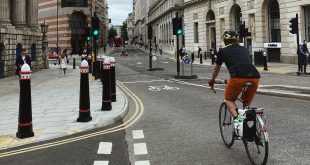A Department for Transport report outlining the typical costs of cycling interventions has been published today.
The summary costs are based on phase 1 of the Cycle City Ambition programme, with the report covering outputs from capital expenditure.
Types of scheme include cycle superhighways, mixed strategic cycle routes, resurfaced cycle routes, cycle bridges, 20mph zones, remodelling major junctions and cycle crossings on major roads.
A cycle superhighway is an extended cycle route that enables direct, rapid and safe cycle trips that are largely segregated from traffic along an arterial route.
Costs range from £1.15 million to £1.45 million per kilometre for a two-way physically segregated superhighway, to £740,000 per kilometre for a two-way lightly segregated superhighway.
To minimise traffic disruption, construction of a physically segregated space for cyclists has to be restricted to off-peak periods or overnight, adding costs, whereas light segregation may have lower capital costs but also feels less secure for cyclists.
A mixed strategic cycle route costs £460,000 to £880,000 per km, and includes a mixture of a signed route without dedicated lanes along quieter roads, on-road lanes without physical segregation, physically segregated cycle lanes along busier roads and marked cycle routes away from roads where such alignments are available.
In town centre environments with restricted space heavy expenditure may be required on wholesale street redesign, and if these centres have historic value costs are increased due to special design and materials needed to conserve the historic environment.
A resurfaced cycle route costs £140,000 to £190,000 per kilometre for canalside routes, as resurfacing to upgrade a path already developed for cycling is likely to cost less than starting from grass and mud.
Signing, lighting and wider paths are desirable but add cost, and significant civil engineering works, to alter a canal or create new and improved accesses with suitable gradients, also increase costs sharply.
Projected costs of new cycle bridges range from £1 million to £5 million, covering a range of bridge spans and design specifications, with bridge upgrades costing £100,000 to £500,000.
20mph zones cost £10,000-15,000 per km with traffic calming measures, and £2,000-£3,000 per kilometre without.
Costs in city centres and other busy road locations were increased by traffic management measures and out-of-hours working required for highway engineering works, and consultations and pilot schemes with residents and road users required significant expenditure on fees.
Remodelling major junctions has costs of £1.56 million to £1.61 million for cycling-specific schemes and £240,000 for cycling piggybacking on traffic measures.
Costs are fundamentally determined by the number and size of the roads forming the junction, the complexity of the junction layout, and the number of strategic cycle route trajectories across the junction that the junction remodelling caters for.
Cycle-specific budgets may gain efficient results from piggybacking on plans to remodel junctions for general traffic management, but a scheme initiated for cycling reasons may rise in cost due to pressure to resurface the whole junction or improve provision for buses.
Cycle crossings at major roads cost £140,000 to £410,000 and if the crossing requires works to alter the carriageway then costs are likely to rise sharply and upgrading a pre-existing crossing may or may not prove less costly than starting from scratch.
Other schemes include area-wide workplace cycle facilities, area-wide school and college cycle facilities, large-scale cycle parking, large-scale provision of bikes, comprehensive cycle route signage and automatic cycle counters.
 BikeBiz Bicycle and cycling retail news
BikeBiz Bicycle and cycling retail news




